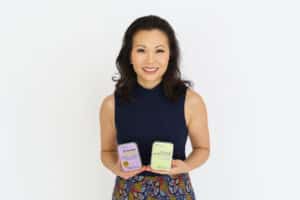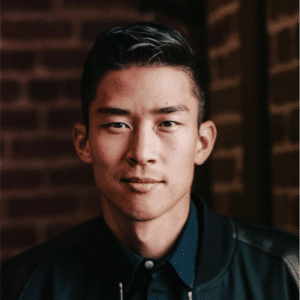Sharing a cookie with a stranger helped me get adopted. I was probably three years old when I stumbled into a meeting between my orphanage directors and two women from the international adoption agency responsible for my life completely changing. My curiosity-induced intrusion aside, the agency women gave me a cookie. I gladly took the treat but proceeded to share it, an atypical act from an orphanage child with food insecure origins. This gesture stayed with the agency women as they recounted the story to my eventual forever family.
Food was a catalyst for my adoption, and eventually my compass as an adoptee. Being an adoptee has often put me on a balance beam of my own identity. When I was little, I never overthought what it meant to be Asian or an adoptee. In my primarily white elementary school, I was never ostracized by peers because I was an adoptee. While many Asian Americans commiserate over being ridiculed in the cafeteria because of their lunchbox and “foreign food,” I never endured that because I ate what all my classmates ate, chicken nuggets or ham and cheese Lunchables. If anything, that was something I yearned for — I wanted to eat Chinese food. I can recall one particular craving for Chinese cuisine leading me to ask my older brother if his Chinese girlfriend could come over and teach my mom how to make fried rice.



Going to a predominantly Asian high school was when I initially felt out of place. Adjusting to a new school district was challenging enough, and now I had to balance my identity with exposure to so many Asians for the first time. I considered myself a banana, yellow on the outside, white on the inside. I couldn’t speak my native tongue, and I couldn’t relate to many of the stories by my Asian peers about their tiger parents or other cultural characteristics you might see in a post on Subtle Asian Traits. I never tasted hot pot, Korean BBQ, or boba before. If the phrase “you are what you eat” has any truth, then I certainly wasn’t Asian enough eating roast chicken and mashed potatoes three times a week.
The prospect of cooking Chinese food myself didn’t authenticate my identity. I remember asking one of my Chinese friends in high school if she or her family could cook the dishes she eats at home for me. She wondered why I couldn’t do it myself, I said, “It’s not the same if I do it.” I longed for a traditional home-cooked meal by someone I considered more “authentically” Chinese than myself. I even attended the same Chinese church as a friend of mine in part because of the potluck meals they have after Sunday service.
I also started taking up Mandarin as my required language to graduate high school. I thought it would be an excellent way to connect to my roots and make other Asian friends. Unfortunately, I wasn’t an outstanding student. I stumbled my way to Chinese 3 because I had to, but not without the help of a tutor all three years. Remembering all the character meanings and writing was the hardest, but I always knew any words relating to ordering food items.

My lack of skill didn’t impress my aloof and austere Chinese 3 teacher, Su Laoshi. In fact, it seemed she wasn’t impressed by anyone. The class was in general agreement; she didn’t seem to like any of us very much. But my opinion of her sentiment towards us changed one day during a potluck to celebrate Lunar New Year. At the end of class, when all the students left, she asked me to stay behind. I thought she wanted to discuss my mediocre performance in her class. Instead of chiding me, she handed me a container stuffed with all the leftover food she had prepared for the potluck. She understood by how much I was gorging myself on the potluck during class, and probably because all my constructed sentences for assignments and projects used food words, that it is what I love.
Su Laoshi expressed her non-verbal affection through food. I would later learn in a food anthropology class at university the origins of the expression.
你吃了吗 (ni chi le ma)? It translates to Have You Eaten Yet? It is a common phrase in China and many other cultures across Asia. It encompasses more than the words at their face value. Sometimes it is said in place of ‘how are you?’ and is used as an expression of caring. Sometimes Asians get stereotyped as not showing much emotion, but there is more than one way to show love for others. Food is its own language, a universal love language. Have You Eaten Yet? is out of concern for that person’s well-being. If they are well fed, they are doing well. If the answer is no, people often offer to cook or get food to remedy that. It’s an act of labor if they are cooking to feed you, to nourish you.

Learning of Have You Eaten Yet? was a revelatory experience. I have embodied the ethos all my life. I grew up asking my mother, “What’s for dinner?” every day because I organize my life and mood around that meal. The curated food guides I painstakingly crafted for friends traveling to a respectable food city or buying friends’ dinner at Michelin-starred restaurants were all ways food tethers me by its love language. I felt it when my friend used her restaurant connections to land me a reservation at the hottest restaurant in LA. I felt it when my Chinese friend invited me over to make dumplings with her mom. Or, most of all, my own mother laboring over the beef and broccoli dish from the Chinese cookbook I asked for on my 11th birthday. I don’t eat beef and broccoli anywhere else.

Attuned by and asking Have You Eaten Yet? might be the most Chinese trait about me. With COVID-19, I can’t ask my friends my favorite question in the same way as before while in lockdown. But we send each other food photos as a way of looking after one another under the philosophy of Have You Eaten Yet? It’s asking, “How are you?” or “Are you well?” Also, tell me what you ate today. Was it delicious? Rather than posting food photos on Instagram, I exchange food photos privately with food friends, or as I lovingly call them, Tastebuds. Whenever a Tastebud takes the time to snap a picture before they dig in and eat, I take it to mean they are thinking of me. Seeing food photos from my friends around the world of varying cuisine transports me to them. It allows me to travel in a time where COVID makes that difficult or impossible. I feel like I’ve indulged at a Michelin 3-star restaurant with my friend in South Korea, eaten a power lunch in the hustle and bustle of New York, and slurped a sumptuous home-cooked beef noodle soup in Pennsylvania all without leaving my home. It’s my preferred kind of postcard to receive. We have forged a satisfying epistolary and epicurean relationship from far away.

With the rise of anti-Asian hate and violence, I’ve made more effort to support Asian-owned restaurants and check in on my Asian friends. Instead of a fight or flight response in these frightening times, I’ve opted for a flock tactic. Food photos from Asian restaurants, ordering food/meal delivery, family recipe exchanges, cooking with one another on camera; through the love language of food, I am flocking and standing in solidarity with my Asian brothers and sisters.

A Tastebud once told me, “Proof is what we call the period of rest for the dough to rise; it’s also a kind of proof of the love and sacrifices parents have made for us. When my family came to adopt me, the orphanage told them my favorite food was congee. But, outside the orphanage, I didn’t eat a lick of it. All I wanted was spicy and flavorful noodles and dumplings. I like to think I got my palate from my birth parents; I will never know. I am what I eat, after all.



